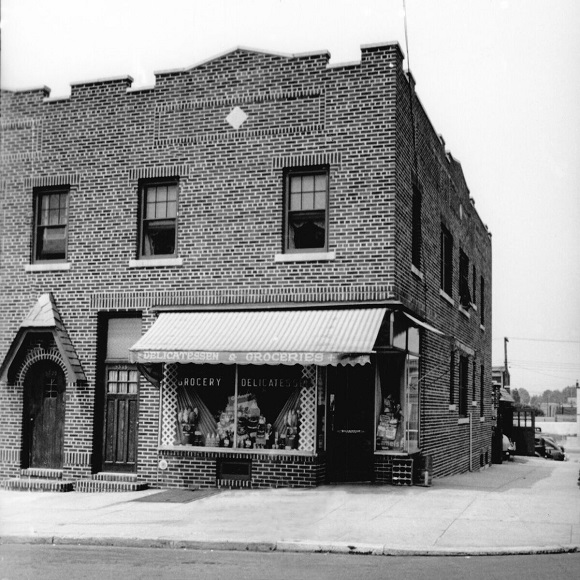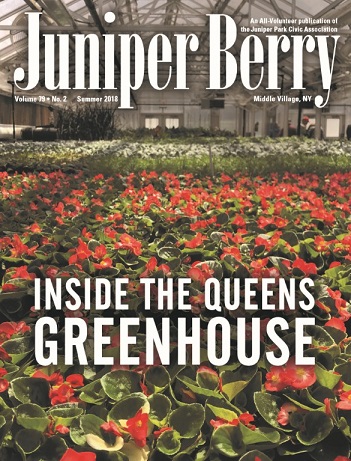In the 1960s, 72nd Street was like any other road in Maspeth. It began at the corner of Grand Ave where the main watering hole was located. Men who put in a hard day’s work would stop in to have a drink, talk, and forget about the events of the day and maybe engage in some conversation about Vietnam, which was just getting the neighborhood’s attention. I was always fascinated by that bar, because it sat high up above the sidewalk, at least 2-3 steps up to the main door that was always open, and I could feel the A/C’s cold air coming out bringing with it the unmistakable smell of tap beer. I remember the sounds of what are now called ’oldies’ played very loudly, and the lighting was purposely kept very dim, mainly a red-light district kind of red with hints of blue. This was state-of-the-art for a professional drinking establishment in the 1960s.
There were never many people inside, three or four men, usually, and sometimes a lady. She appeared older than the men. Her hair looked light orange, coarse and dry. She was always wearing a one-piece dress and heels, with way too much lip stick, and forever holding a lit cigarette. Each time I would pass, it seemed as if she hadn’t moved. I could never see the faces of the men, just their backs and some of their heads, because they always looked down with their shoulders hunched and elbows on the bar. None of this made sense to me because the lights looked really cool, and the music was loud along with the blasting A/C, but nobody was doing anything except sitting there.
Moving along, the street was basically uneventful. The houses were well kept up while some yards had tiny white fences around the flowers, and maybe an ethnically incorrect statue. All were painted to reflect the proud owner’s personality. If the owners were risk takers, they would have invested in something new called aluminum siding, which meant having that same color for at least 10 years, or as a Maspethian would think, 20 years or longer. After all, siding isn’t cheap.
Continuing onward while passing the Norman Rockwellian houses that gave you a feeling that all would be safe and happy forever, you came to the first attraction for a kid, the 112th precinct. I remember all the police cars, black and dark green with an actual cherry looking red light on top. You could hear a very low symphony of radios bouncing back and forth from both sides of the street, all within 200ft of the police station. The white noise sound coming from the police radios would catch your attention, and maybe once in a while, the voice of a dispatcher talking to an officer would just add that finishing touch to the background. The big attraction here would be the latest car wreck or two, and maybe sometimes three or four cars that were towed in from the Long Island Expressway or who knew from where, but they were lined up in front of the station one behind the other. We were never allowed to touch, play, or hang out around the wrecks while the cops were there, but we would often push the limits, test the waters see what we could get away with. The cops had their hang out across the street at Mr. Sherry’s Deli. They would stand around and drink the ice-cold sodas, talk, laugh, exchange information, and I guess try to forget about what they had seen that day, and perhaps the dangers that might be only hours away.
Mr. Sherry’s Deli was a small wonderland for me, and Mr. Sherry was a quite small-framed old man with white hair and thick black frame eyeglasses who seemed to like kids. I never heard him yell. He seemed to always treat us with respect and patience. The first introduction to this wonderland was the large red ice box that sat just right of the front door. It had all sorts of soda company stickers adorning it, along with a large worn silver bottle cap opener affixed to its front with a cardboard box underneath to catch the caps. This box was large for a 5- to 7-year old boy. It stood between 3 & 4 feet tall, and was perhaps 5 feet wide, with one main flip open door and two smaller ones that in total made up the entire top surface. These were the guardians of the nectar, and when opened, presented the mother lode and the end of your parched throat: soda! Sodas of all kinds like the United Nations. There was Coca-Cola (not Coke back then) also 7-Up, Pepsi, plus sodas with names that weren’t famous yet with fun looking colors, and of course, Yoo-Hoo. I remember these sodas caressed in ice that looked like large chunks of uncut diamonds, and the water was so cold it would hurt your hand if you kept in too long. The amazing thing is that there was an honor system back then that was connected to that box. It was understood that you would pay Mr. Sherry inside, walk outside and then take your soda, and just that soda you paid for. Nobody stole, not us kids, not the cops, not the neighbors, nobody.
The inside had adult things, like food, which was of no importance to me. My concern was the rubber balls, Pensy Pinky vs Spalding. The debate between the two was like politics today: which one is better, which one bounces higher. I remember the 15-cent cheap balsa wood planes that would break immediately upon assembly. The bazooka Joe bubble gum for one penny, and baseball cards which came in a pack of five that also had a thin layer of bubble gum the same size as the cards, all for a nickel. And not to leave out the tons of candies, chocolates, Baby Ruths and things with wild colors and shapes that I would never eat today, but they were there if I wanted them. It was very polarized in relation to purchase preference. The guys had their choices, and the girls liked different things. I never saw a girl chomp down on a Baby Ruth. The girls had Dante candies in mind, like those candy necklaces made out of pastel colored sugar tablets, because it just wouldn’t ladylike to be seen eating a gooey Baby Ruth.
Leaving Mr. Sherry’s Deli with bounty in hand and then heading by bike toward Calamus Ave, you would notice in the distance what seemed to be the end of the world. The street appeared to stop sharply up ahead. The odd thing was that as you got closer and closer, you were seeing the tops of trees and houses and not the whole tree or all of the houses anymore. When finally reaching the summit, and my grandmother’s house, looking down, there it was: Snake Hill, a daredevil bicyclist’s dream! But before considering trying any fancy maneuvers, my attention was captured by the smell of freshly baked pastry, and not just any pastry – it was Grandma’s – and it was fantastic and has never been duplicated by anyone anywhere since. I needed nourishment and strength to deal with the task at hand. Fresh baked pie and ice-cold milk was just what the doctor ordered.
Paul Defalco grew up in Maspeth



